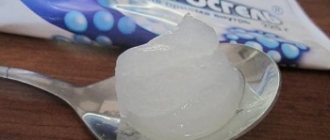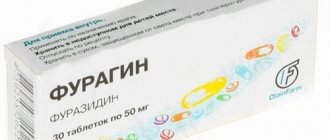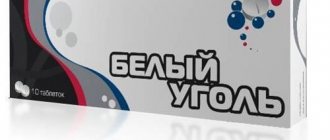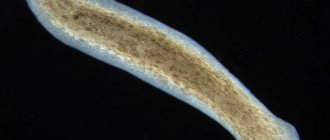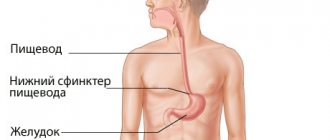Types of intestinal infections
The entire variety of intestinal infections includes only four types of pathogens:
- Viral intestinal infections - among these there are viruses that affect the main human organs (polioviruses, Coxsackie viruses A and B, enteroviruses), which can cause paralysis, affect the central nervous system, liver and pose a direct threat to the vital functions of the body. As well as viruses that are limited to intestinal symptoms: diarrhea and gastroenteritis of varying severity (rotaviruses, intestinal adenoviruses, astroviruses and coronaviruses).
- Bacterial intestinal infections – the leading role in bacterial intestinal infections is played by enterotoxins, which are released by bacteria during their life (Escherichia coli, Vibrio cholerae, Salmonella, Shigella, Yersinia, Klebsiella). Regardless of the characteristics of the processes occurring in the intestines, any of the pathogens causes diarrhea syndrome with the removal of water from the body and the leaching of both harmful and beneficial substances. Leads to water-electrolyte imbalance.
- Fungal intestinal infections - most often caused by fungi of the genus Candida.
- Protozoal infections – giardiasis, amoebiasis.
Determining the pathogen plays an important role when choosing a medicine for poisoning or intestinal infection.
Advantages and disadvantages
The main advantage is the direct effect on the intestinal tract . After the suppository dissolves, the active substances reveal their therapeutic properties. The suppositories are easy to use, do not affect the gastric mucosa, and are compatible with other drugs of various pharmacological groups.
Disadvantages include:
- local impact only;
- leaking and staining of laundry;
- the need for careful hygiene of the anus and hands during insertion;
- short shelf life.
When not recommended for use
Rectal suppositories against intestinal dysbiosis should not be used in case of individual intolerance to the components, persistent diarrhea, exacerbation of hemorrhoids, menstruation in women. Restrictions also apply to age: their administration to newborns and children under one year is not recommended.
Symptoms for intestinal infections
Depending on the degree of poisoning, the type of pathogen and the amount of toxic substance entering the body, the symptoms will vary from pronounced to diseases with scanty symptoms of a general nature. Intestinal symptoms are common to many intestinal infections.
- Diarrhea is the first obvious manifestation of an intestinal infection. It has the appearance of unformed feces of a different nature (from mushy, abundant watery, to the release of a meager amount of feces with an abundance of mucus and blood elements). Diarrhea occurs three times a day and intensifies and becomes more frequent with the severity of the disease.
- Constipation is also a variant of the development of intestinal infection, when watery stool cannot be passed due to the formation of fecal plugs. Retention of feces in the intestinal lumen leads to the reabsorption of toxic components into the body and the manifestation of a general decrease in immune forces.
- Temperature increase - up to 37.5 in the initial stages of the disease, up to 38.5–39 in acute or undiagnosed disease.
- General weakness, fatigue - an increase in the volume of toxic toxins in the circulating blood leads to the development of general intoxication of the body.
- The feeling of aching is a consequence of the inflammatory process in the body and the fight against it. Accompanied by elevated temperature.
- Abdominal pain is often sharp, spasmodic in nature, temporarily passing into a resting phase, and then recurring with more frequent frequency.
- Nausea and vomiting are an example of an inflammatory process that has already spread throughout the body with a stream of toxic toxins.
In the acute course of the disease, frequent diarrhea, the symptoms become more pronounced, the pain intensifies, the intestinal syndrome worsens and brings even more inconvenience. And the need to use medications for intestinal infections increases.
- False urge to defecate – when the intestinal walls are irritated by feces or infectious pathogens. Often occurs in the absence of the amount of feces necessary for defecation, accompanied by the release of mucus and a scanty amount of feces of varying consistency. The desire to have a bowel movement does not disappear.
- Tenesmus is a painful false urge, in which sharp cramping pains of a spastic nature are added to the usual sensations.
- Flatulence (bloating) can occur at any stage of the disease and accompanies almost any intestinal infection. Their quantity depends not only on the severity of the disease, but also on the food set used for food. Thus, legumes, vegetable products, yeast-containing and starchy products cause more gas formation.
- Lack of appetite - due to intoxication of the body. It is promoted by stagnant processes in the stomach and intestines.
- The condition of the tongue is a dry tongue with a grayish-yellow coating as a clear sign of glossitis (an inflammatory process of the body manifested on the tongue). A tongue coated with a thick white coating is observed during constipation or an acute period of intestinal infection.
Treatment
Treatment is based on removing pathogenic organisms and the toxins they produce from the blood circulation. It is directed against the pathogen as the cause of the disease and is inextricably linked with diagnosis. Treatment is not aimed at suppressing symptoms, but at removing dangerous substances and restoring the strength of the body as a whole.
Depending on the severity of the disease, it can be carried out at home or in a hospital, under the supervision of medical staff.
It involves the patient taking medication for intestinal infections, drinking plenty of fluids to restore water balance, and generally strengthening the body through increased nutrition with the necessary set of microelements and vitamins.
Complexes of beneficial bacteria
Currently, all these drugs are divided into probiotics and prebiotics. What to choose in case of rotavirus? After all, most often the doctor gives the patient freedom in this matter. First you need to figure out what these and other drugs are for.
Probiotics are complex products containing beneficial bacteria (lacto-, bifido-, non-pathogenic colonies of Escherichia coli and others). Prebiotics are medications that feed existing beneficial bacteria. Such drugs also help improve digestion and normalize the balance of bacteria in the body.
The medicine against rotavirus must be a probiotic. During illness, diarrhea removes all good substances from the intestines; sorbents eliminate harmful microorganisms along with beneficial ones. The antibiotics used also negatively affect the microflora. In this regard, means for restoring normal flora must contain bacteria, and not substances that promote their growth. Such medications include Linex, Acipol, Bifiform, Imoflora, Primadofilus and many others.
Treatment of intestinal infections with folk remedies
Traditional medicine is good for intestinal infections with mild symptoms, in the absence of an exacerbation stage.
- St. John's wort decoction - pour one and a half tablespoons of chopped herb with a glass of boiling water, heat in a water bath, and then dilute the resulting decoction to its original state. Consume at least three times a day, two days, store the broth in the refrigerator.
- Oak bark decoction - pour 10 g of oak bark with a glass of boiling water, boil for 20 minutes and consume 5 times a day before meals.
- Decoctions of calamus or marshmallow root help relieve symptoms of intoxication.
Also, various herbal infusions (alder cones, cinquefoil root, nettle leaves) can be used as a medicine for intestinal infections.
Emergency medicine for intestinal infections
Emergency care is necessary for acute intestinal infections with severe diarrhea and intoxication syndrome: with bowel movements more than eight times a day, including cholera, when stool takes on the appearance of rice water.
In this case, an indispensable medicine for intestinal infections is:
- Carrying out infusion therapy with saline solutions.
- Intramuscular injection of a lytic mixture consisting of Diphenhydramine (1% - 1 ml), Papaverine (2% - 2 ml) and Analgin (50% - 2 ml).
- Take diluted powder “Regidron” or “Gastrolit” orally - in fractions, 0.5 teaspoon each.
- Urgent hospitalization in a hospital, preferably of an infectious type.
Medicine for intestinal infections for children
For acute intestinal disorders in children under three years of age, treatment requires the immediate intervention of specialists. In case of mild severity of the disease, when there are no pronounced pain symptoms, nausea and vomiting, mild diarrhea (2-3) times a day, mushy stool with a small amount of mucus, therapy can be carried out at home.
It is very important to choose a medicine for intestinal infection for children, since their body is very weak and even mild dehydration can lead to irreparable negative consequences.
In addition to the standard restoration of water-salt balance, the following medications for intestinal infections are used:
- “Smecta” is a powder for preparing a suspension, used for children from birth, eliminates intestinal symptoms, including bloating. Up to 1 year – 1 sachet once a day, over two years – up to 3 sachets per day.
- “Stopdiar” is a ready-made suspension, suitable for children from 2 months of age, used 1 scoop 1-2 times a day.
- “Enterogel” is a sorbent with a pasty consistency, used in children under 1 year of age, 5 (ml) 2 times a day.
For light but frequent bowel movements, biological products (Lacidophil, Linex, Enterozermina) are used as a cure for intestinal infection.
What is food poisoning
Food poisoning is an acute short-term disease, the development of which involves opportunistic microorganisms or their metabolic products - toxins. So, it often happens that after a long stay of the finished product in improper conditions (in the sun, or a day without a refrigerator), some microorganisms begin to multiply and release harmful particles - toxins. Normally, small amounts of these bacteria or viruses do not cause harm to humans. But after death or in a certain critical quantity, they cause food poisoning.
Prevention of intestinal infections
- Clean hands. Pure vegetables and fruits eaten.
- Compliance with food preparation rules.
- Sufficient heat treatment of meat products and eggs.
- Strengthening the immune system. The use of drugs for the prevention of intestinal infections: biological products “Bifidumbacterin”, “Acilact”, “Enterozermina”.
Many people wonder if there are medications to prevent intestinal infections. There are none as such, it will be enough to follow the above recommendations.
Medicines for intestinal infections at sea
It is better to choose medications for intestinal infections for the treatment and prevention of diseases while on vacation in a ready-to-use form. For children, these will be suspensions “Nifuroxazide”, “Stopdiar”, “Enterozermina” - a liquid enriched with live bacteria in bottles. Activated carbon capsules and tablets are suitable for adults. Regidron powder for poisoning accompanied by severe vomiting.
By the way
“If you return from vacation and notice that your stool has changed a little (you started going to the toilet a little more often or you have constipation, diarrhea, etc.), but otherwise feel fine, you need to consult a specialist,” advises Alexander Bronstein, head of the tropical medicine office at IKB No. 1, professor.
- This may be a sign of infection with amoeba, which is very common in hot countries. The insidiousness of the amoeba is that without treatment it can lead to the development of an abscess (ulcer) in the liver, perforation and intestinal tumors. You should also consult a doctor if you have suffered an intestinal infection while on vacation. Perhaps its cause was an amoeba, which is treated in a completely different way.
https://youtu.be/aA6ZKg9qZHc
Help with acute intestinal infections and body poisoning
Medicine against intestinal infection is prescribed exclusively by a doctor. You can only provide first aid to the patient.
It consists of rehydration, the use of medications aimed at removing infection from the body, and urgent hospitalization in an outpatient clinic to provide adequate treatment until complete recovery. Under no circumstances should the symptoms be suppressed by taking pain medication. The appearance of blood streaks in the stool indicates the severity of the disease and requires immediate treatment.
Priorities for choosing medications
It is up to you to choose which medications to use for intestinal infections. When choosing dosage forms, pay attention, especially when it comes to young children. Recently, doctors are increasingly paying attention to such a medicine as Enterofuril, it is available in capsules and in the form of a suspension, and has a small number of side effects.
When starting treatment and mild manifestations of the disease, leave the choice to the simplest drugs: “Activated carbon”, “Smecta”. There is no need to overload the body with chemical compounds.
Medicines for intestinal infections in adults will be stronger than in children.
Choose complex treatment of different directions: restoration of water-salt balance, elimination of symptoms (diarrhea, bloating, pain), strengthen the body with the use of living beneficial microorganisms from biological products, supporting the intestines.
But not only medications for intestinal infections can help. Do not forget about proper nutrition, as often foods, if stored incorrectly, can cause intestinal upset and poisoning.
Antiviral compounds
What medicine is used for rotavirus in children? When pathology appears in children, doctors recommend the use of antiviral compounds. The child's body is weak enough to cope with the problem on its own. Immunomodulatory agents will help restore the body's resistance and cope with viruses.
The most popular medications are:
- "Anaferon" (affinity purified antibodies to interferon).
- "Ergoferon" (antibodies to interferon gamma).
- "Tsitovir" (thymogen, benzazole, ascorbic acid) and so on.
The same list includes rectal suppositories based on interferon: “Kipferon”, “Genferon”, “Viferon”. Some drugs can only be used after a year. Therefore, it is advisable to study the instructions before use.

